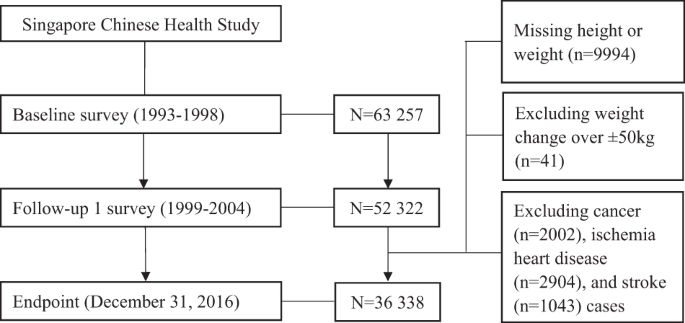
Weight change in relation to mortality in middle-aged and elderly Chinese: the Singapore Chinese Health Study
- Select a language for the TTS:
- UK English Female
- UK English Male
- US English Female
- US English Male
- Australian Female
- Australian Male
- Language selected: (auto detect) - EN
Play all audios:
To examine the association between weight change and mortality in middle-aged and elderly Chinese.
We used data from the Singapore Chinese Health Study among 36 338 participants aged 45 to 74 years at recruitment (1993–1998). Weight change was computed as the difference between weights at
baseline and the follow-up 1 (1999–2004) surveys and classified as moderate-to-large weight loss (≥10%), small weight loss (5.1–9.9%), stable weight (±5%), small weight gain (5.1–9.9%) and
moderate-to-large weight gain (≥10%). The participants were free of cancer and cardiovascular disease (CVD) at the follow-up 1 survey and were followed for mortality through linkage with the
Singapore Birth and Death Registry.
Until 31 December 2016, a total of 7551 deaths were identified during 517 128 person-years of follow-up (mean follow-up: 14.2 years). Compared to those with stable weight, significantly
increased risk of all-cause mortality was found for participants with moderate-to-large weight loss (hazard ratio [HR]: 1.39; 95% CI: 1.30, 1.49), small loss (1.14; 1.06, 1.22), and
moderate-to-large gain (1.13; 1.05, 1.22). Moderate-to-large weight loss was significantly associated with increased risk of mortality from CVD (including both ischemic heart disease and
stroke) and respiratory disease, while moderate-to-large weight gain was significantly associated with CVD mortality. Associations were generally consistent in stratified analyses by sex,
age groups (